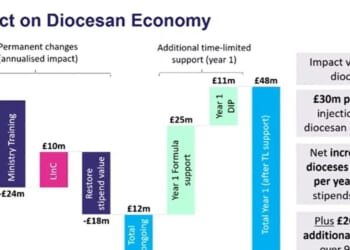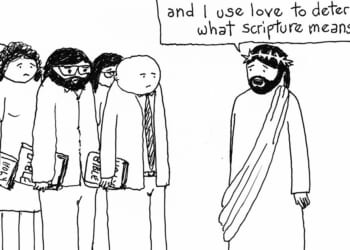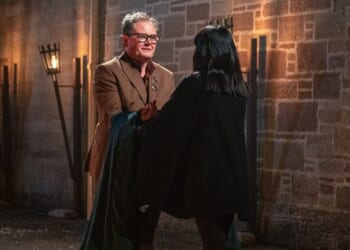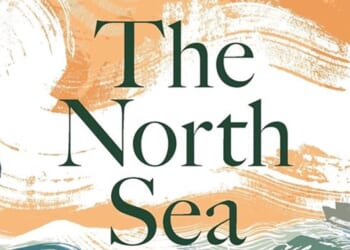Editor’s note: This week, we’re reprinting some of our best stories from the past year. In this piece, originally published in September, Daily Wire editor emeritus Ben Shapiro remembers Charlie Kirk.
***
“Hi, Mr. Shapiro, I’m Charlie Kirk.”
Charlie was 18 years old when I met him at an event at The Breakers, the rather ritzy Palm Beach hotel that served as the gathering spot for the annual David Horowitz Freedom Center donor weekend. Charlie had just started an organization, and he was pitching me on it, an organization called Turning Point USA. I’d never heard of it, of course: He had just graduated high school, and the group had its seed donors but was still in its infancy.
Charlie was eager, and he was aggressive, and he was whip-smart. His energy was almost exhausting.
When he walked away, I turned to my friend Jeremy Boreing and said, “That kid is going to be the head of the Republican National Committee one day.”
I was wrong. Charlie became far more important than that.
Charlie’s Turning Point USA became the single most important conservative political organization in the country. And it grew because Charlie grew. He turned himself into an excellent public speaker and a talented debater. He could fundraise better than anyone in the game. He was friendly and gregarious to everyone. His drive was unmatched, because he cared about his fundamental values.
The clips of Charlie on campus — the firebrand Charlie — make for great watching, but they don’t do him full justice. Behind the scenes, Charlie was deeply thoughtful, constantly seeking ways to build and grow coalitions. That’s a messy business, and it comes with aches and pains. No one did it better. That’s how a guy who never went to college ended up as a confidant of the President of the United States, the vice president, and pretty much everyone else on the right side of the aisle.
Charlie never stopped moving. He never stopped talking and negotiating and debating and working. That infectious energy never left him. Until a killer’s bullet ripped his life from him. And there are no more words. There can be no more words.
It’s impossible to process what it means when a 31-year-old man is murdered. A husband. A father of two young children. Assassinated, it would appear, for the crime of passionately speaking the truth, debating politics and discussing ideas, and working to make the country a better place as he saw it.
But here’s one thing we do know: This all has to stop. It’s an ugly picture that we’ve seen before. The 1960s and 1970s were a time of tremendous change in American history, and of tremendous violence. Political assassinations became commonplace; bombings and terror attacks were excused by a variety of supposedly great intellectuals. And eventually, America rejected all of it. Now, we’re watching the same ugly picture reappear.
A wave of violence is building, from the assassination of Charlie Kirk to the attempted shooting of President Trump, from the murder of UnitedHealthcare CEO Brian Thompson to the slaying of two Israeli embassy staffers. All of these acts of extreme violence have found support in the dark precincts of political radicals.
The temperature in our country has steadily been rising. And it’s been rising because many people have determined that their political opponents aren’t just opponents, but enemies, threats to their very existence. That determination by fringe actors is often reinforced in the online spaces that prize virality and mirror emotional excess. And then, it breaks free from the world of the online, into real life, with bloody and horrific consequences.
Yes, that phenomenon crosses the political aisle. But to pretend that the phenomenon is distributed equally would be a mistake. The rising tide of violence on the left has become more and more virulent over the course of the last several years. The argument that speech is violence, to be met with violence; the argument that opposition to contention amounts to a form of “genocide” or “erasure”; the argument that political opponents are moments away from ending our republic outright. These views all trend toward revolutionary violence.
And the wave of violence, a wave already breaking on the shoreline, appears as though it is only the beginning. It has already destroyed Charlie Kirk’s family and ended his life at the age of 31.
But it feels as though a tsunami is coming. The water has already receded from the shoreline. And what comes next could be far more devastating even than what we have seen thus far.
That tsunami, if left unchecked, will wash away this entire republic.
I’ve spoken at dozens of college campuses; I’ve required heavy security at many of them. My security has instructed me to wear bulletproof vests, insisted on metal detectors, told me to leave venues they considered nonsecure. And yet I’ve never truly felt unsafe, because to do so would be to accept—even consider—the idea that an American would truly harm someone simply for speaking freely in the United States of America. I don’t believe that anymore. I’m not sure who does.
So, what can be done? It’s frequently said by those of politically liberal persuasion that thoughts and prayers aren’t enough. That action is necessary. But here is the truth: We need more thoughts and prayers. Thoughts for our political opponents: recognition that while we disagree, they are our fellow Americans; understanding that the freedoms guaranteed by the Constitution of the United States can hold only if we treat each other as friends, not enemies; realization of the fact that speech is not violence, and that we must, as Americans, speak with each other. The way Charlie did.
And we need prayers: prayers for our country, which is torn apart, under attack from within and without; prayers for our own souls, that we hold ourselves accountable for the way we treat others.
Our America is a robust place of discussion and debate, of liberty and rights. But all of that must be undergirded by basic virtue. Basic decency. Respect for others. And yes, reverence for the uniqueness of an America that values speech and deplores violence.
Charlie had that reverence. And for that, he was murdered.
May his memory be a blessing—for us, and for our bleeding nation.

















